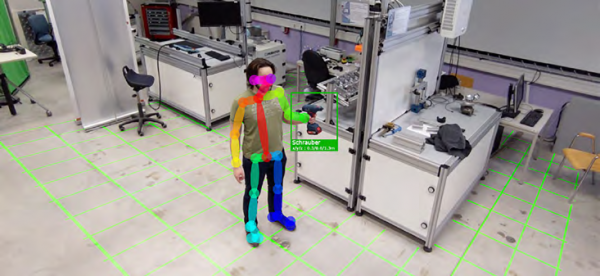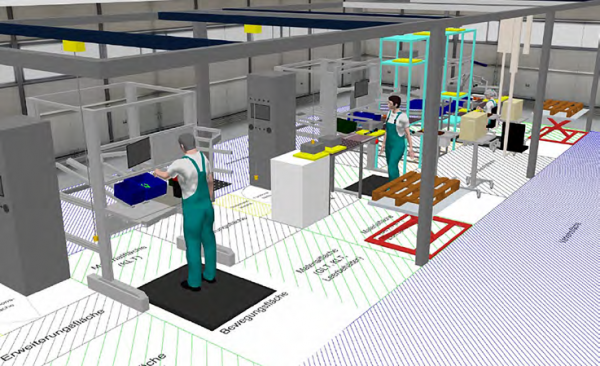Hybrid Work Systems - Platform-based AI System for Human Motion Analysis to optimize Ergonomics of Hybrid Work Systems
Short Description
Hybrid Work Systems: Safe and ergonomic production
Increasing automation is turning factories into complex socio-technological environments. The workers and their needs should be placed at the centre of a safe and human-friendly production environment.
Industrial processes are becoming increasingly intelligent, so that more and more people are working with collaborative robots and are assisted in their work by information systems. Many industrial companies are already using complex simulations to model individual production steps and optimise path planning and ergonomics.
The results of the Hybrid Work Systems project will be used to automate and simplify video-based motion analysis of production activities and the semantic description of work processes using artificial intelligence. Based on the current state-of-the-art and recent research findings, the project team will develop an extended, standardised, and formal layer model of industrial processes.
This model can be used to describe assembly processes, assistive interventions, ergonomic improvement potentials as well as human/machine interaction in collaborative robotics. This allows companies to plan and optimise individual assembly steps and to protect their workforce against long-term health effects. The technology developed in this project will be made available to industrial companies as a digital service via a cloud-based Industry 4.0 platform.
Technological goals of Hybrid Work Systems
- Integration profiles and interface engines for hybrid human/machine processes
- Video-based motion analysis for industrial activity detection
- Semantic description of industrial processes for detailed process design
- Interfaces for human-machine situation awareness in production environments
- Interoperation of motion analysis, cognitive and semantic models
- Integration into a European production platform and validation
The project leverages the know-how from Austrian flagship projects and establishes interfaces to the EU's EFPF – European Factory Platform, a digital ecosystem for the European manufacturing industry. The results will be directly fed into the Digitising European Industry initiative and will also be applicable to other sectors.
Project Partners
Consortium lead
Salzburg Research
Other consortium partners
- Fraunhofer Austria Res GmbH
- imk automotive GmbH (DE); INNIO Jenbacher GmbH & Co OG
- MTM ASSOCIATION e. V.
- PROFACTOR GmbH
- BRP Rotax GmbH & Co KG
Contact Address
Salzburg Research
Mag. Wernher Behrendt
Jakob Haringer Straße 5/3
A-5020 Salzburg


